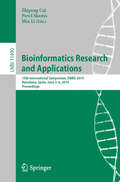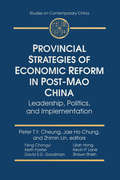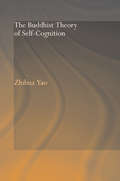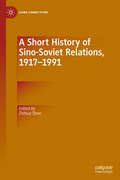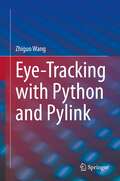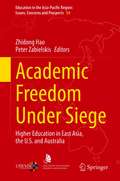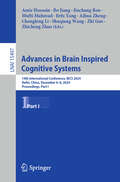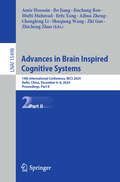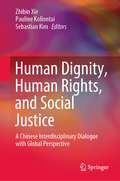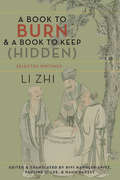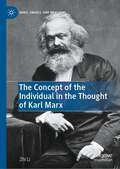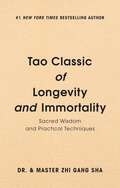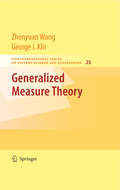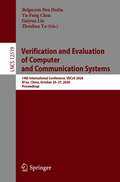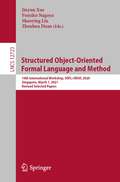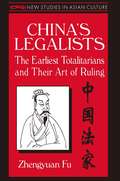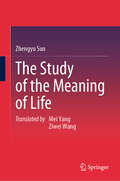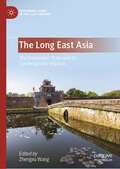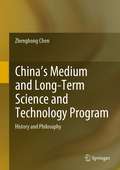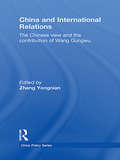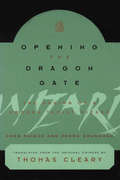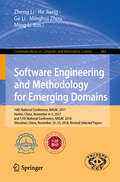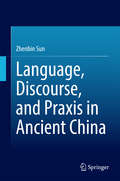- Table View
- List View
Bioinformatics Research and Applications: 15th International Symposium, ISBRA 2019, Barcelona, Spain, June 3–6, 2019, Proceedings (Lecture Notes in Computer Science #11490)
by Min Li Pavel Skums Zhipeng CaiThis book constitutes the proceedings of the 15th International Symposium on Bioinformatics Research and Applications, ISBRA 2019, held in Barcelona, Spain, in June 2019. The 22 full papers presented in this book were carefully reviewed and selected from 95 submissions. They were organized in topical sections named: genome analysis; systems biology; computational proteomics; machine and deep learning; and data analysis and methodology.
Provincial Strategies of Economic Reform in Post-Mao China: Leadership, Politics, and Implementation (Studies On Contemporary China)
by Zhimin Lin Jae Ho Chung Peter T.Y. CheungFocusing on the role of provincial leadership in the initiation and implementation of economic reform, this text studies economic decentralization in eight Chinese provinces. In each area, resource allocation and acquisition of foreign capital and investment are investigated.
The Buddhist Theory of Self-Cognition (Routledge Critical Studies in Buddhism)
by Zhihua YaoThis highly original work explores the concept of self-awareness or self-consciousness in Buddhist thought. Its central thesis is that the Buddhist theory of self-cognition originated in a soteriological discussion of omniscience among the Mahasamghikas, and then evolved into a topic of epistemological inquiry among the Yogacarins. To illustrate this central theme, this book explores a large body of primary sources in Chinese, Pali, Sanskrit and Tibetan, most of which are presented to an English readership for the first time. It makes available important resources for the study of the Buddhist philosophy of mind.
A Short History of Sino-Soviet Relations, 1917–1991 (China Connections)
by Zhihua ShenDrawing on the rich trove of recently declassified Russian and Chinese archival materials, this history of Sino-Soviet relations in the 20th century sheds new light on key events during this period. It offers fresh insights into the role of ideology and national interests in the evolution of the complex and turbulent relationship between not just the two countries but also their respective Communist Parties. The chapters on the normalization of bilateral ties provide an in-depth analysis of divisions in the socialist camp that culminated in both its collapse and the disintegration of the Soviet Union. The book argues that 20th century Sino-Soviet relations reflected both long-standing and emerging political and geopolitical challenges facing members of the Cold War socialist camp, in particular tensions between the ideal of internationalism and national aspirations, between commitment to the principle of sovereignty and commitment to that of equality in international relations, and between inter-party relations and inter-state relations. This makes for a valuable addition to the reading lists of all those interested in the development of the relationship between two of the world’s most important countries.
Eye-Tracking with Python and Pylink
by Zhiguo WangSeveral Python programming books feature tools designed for experimental psychologists. What sets this book apart is its focus on eye-tracking.Eye-tracking is a widely used research technique in psychology and neuroscience labs. Research grade eye-trackers are typically faster, more accurate, and of course, more expensive than the ones seen in consumer goods or usability labs. Not surprisingly, a successful eye-tracking study usually requires sophisticated computer programming. Easy syntax and flexibility make Python a perfect choice for this task, especially for psychology researchers with little or no computer programming experience.This book offers detailed coverage of the Pylink library, a Python interface for the gold standard EyeLink ® eye-trackers, with many step-by-step example scripts. This book is a useful reference for eye-tracking researchers, but you can also use it as a textbook for graduate-level programming courses.
Academic Freedom Under Siege: Higher Education in East Asia, the U.S. and Australia (Education in the Asia-Pacific Region: Issues, Concerns and Prospects #54)
by Zhidong Hao Peter ZabielskisThis book argues that academic freedom in higher education in East Asia, the U.S. and Australia is under stress. Academic freedom means freedom to teach, research, and serve in multiple political and social roles based on professional principles. It is closely linked to shared governance, in which academics participate in and influence decision making in core academic concerns such as choosing new faculty, faculty promotion, tenure decisions and the approval of new academic programs.In different countries and regions, the duress confronting academic freedom may come from different directions, and the ability of faculty to share power can vary greatly. In authoritarian mainland China, it is mostly political and ideological controls that greatly affect academic freedom, and shared governance is very much limited. In semi-democracies like Hong Kong and Macau and democracies like Taiwan, Japan, South Korea, the U.S. and Australia, corporatization and commercialization have had great impact on both academic freedom and shared governance. The result is that the roles professors play within academia are continually being diminished and the academic profession is struggling to maintain its ground. Similar developments are also occurring in Europe. These developments should cause great concern to educators, researchers and policymakers everywhere. The authors collected here present attempts to learn from current practice in order to move policy into directions that will help protect higher education as a common good. This book highlights the importance of academic freedom and provides insights into the ways it is being infringed both by commercialization and corporatization on the one hand and political repression on the other. It vividly illustrates detailed case studies and empirical data that make it a compelling read.- Professor Ruth Hayhoe, University of Toronto, Canada Academic freedom is as important today as at any time in the last century. The authors point out the challenges that academic freedom faces on a global scale. The import of the book is in its comparative perspective steeped in data and analysis. Thoughtful. Cogent. Compelling. - Professor William G. Tierney and Professor Wilbur-Kieffer, University of Southern California, United States
Advances in Brain Inspired Cognitive Systems: 14th International Conference, BICS 2024, Hefei, China, December 6–8, 2024, Proceedings, Part I (Lecture Notes in Computer Science #15497)
by Amir Hussain Bo Jiang Jinchang Ren Chenglong Li Mufti Mahmud Erfu Yang Aihua Zheng Shuqiang Wang Zhi Gao Zhicheng ZhaoThe two-volume set LNAI 15497 and LNAI 15498 constitutes the refereed proceedings of the 14th International Conference on Brain Inspired Cognitive Systems, BICS 2024, held in Hefei, China, during December 6–8, 2024. The 56 full papers presented in these two volumes were carefully reviewed and selected from 124 submissions. These papers deal with various aspects of brain inspired cognitive systems, focusing on latest advancements in brain-inspired computing; artificial intelligence; and cognitive systems.
Advances in Brain Inspired Cognitive Systems: 14th International Conference, BICS 2024, Hefei, China, December 6–8, 2024, Proceedings, Part II (Lecture Notes in Computer Science #15498)
by Amir Hussain Bo Jiang Jinchang Ren Chenglong Li Mufti Mahmud Erfu Yang Aihua Zheng Shuqiang Wang Zhi Gao Zhicheng ZhaoThe two-volume set LNAI 15497 and LNAI 15498 constitutes the refereed proceedings of the 14th International Conference on Brain Inspired Cognitive Systems, BICS 2024, held in Hefei, China, during December 6–8, 2024. The 56 full papers presented in these two volumes were carefully reviewed and selected from 124 submissions. These papers deal with various aspects of brain inspired cognitive systems, focusing on latest advancements in brain-inspired computing; artificial intelligence; and cognitive systems.
Pragmatic Strategy: Eastern Wisdom, Global Success
by Zhichang Zhu Ikujiro NonakaPragmatism is enjoying a renaissance in management studies and the social sciences. Once written off as amoral, relativist and opposed to the ideals of Truth, Reason and Progress, it is now regaining influence in public policy, international relations and business strategy. But what can pragmatism teach us about strategy? How can pragmatic strategies help businesses to succeed? This innovative book presents a pragmatic framework for shaping and solving strategic problems in a practical, creative, ethical and finely balanced manner. To achieve this, the authors draw from Confucian teaching, American pragmatism and Aristotelian practical wisdom, as well as business cases across industries and nations, particularly from emerging economies. With significant theoretical depth, direct practical implication and profound cultural sensitivity, the book is useful for executive managers, public administrators, strategy researchers and advanced students in the search for pragmatic strategies in an interconnected, fast-moving world.
Human Dignity, Human Rights, and Social Justice: A Chinese Interdisciplinary Dialogue with Global Perspective
by Pauline Kollontai Sebastian Kim Zhibin XieThis book explores human dignity, human rights and social justice based on a Chinese interdisciplinary dialogue and global perspectives. In the Chinese and other global contexts today, social justice has been a significant topic among many disciplines and we believe it is an appropriate topic for philosophers, theologians, legal scholars, and social scientists to sit together, discuss, enrich each other, and then deepen our understanding of the topic. Many of them are concerned with the conjuncture between social justice, human rights, and human dignity. The questions this volume asks are: what’s the place of human rights in social justice? How is human dignity important in the discourse on human rights? And, through these inquiries, we ask further: how is possible to achieve humanist justice? This volume presents the significance, challenges, and constraints of human dignity in human rights and social justice and addresses the questions through philosophical, theological, sociological, political, and legal perspectives and these are placed in dialogue between the Chinese and other global settings. We are concerned with the norms regarding human dignity, human rights and social justice while we take seriously into account their practice. This volume consists of two main sections. The first section examines Chinese perspectives on human rights and social justice, in which both from Confucianism and Christianity are considered and the issues such as patriotism, religious freedom, petition, social protest, the rights of marginalized people, and sexual violence are studied. The second section presents the perspectives of Christian public theologians in the global contexts. They examine the influence of Christian thought and practice in the issues of human rights and social justice descriptively and prescriptively and address issues such as religious laws and rights, diaconia, majoritarianism, general equality, social-economic disparities, and climate justice from global perspectives including in the contexts of America, Australia, Israel and Europe. With contributions by experts from mainland China, Hong Kong, South Korea, Australia, New Zealand, the UK, USA and Norway, the book provides valuable cross-cultural and interdisciplinary insights and perspectives. As such it will appeal to political and religious leaders and practitioners, particularly those working in socially engaged religious and civil organizations in various geopolitical contexts, including the Korean Peninsula and Japan.
A Book to Burn and a Book to Keep: Selected Writings (Translations from the Asian Classics)
by Zhi LiLi Zhi's iconoclastic interpretations of history, religion, literature, and social relations have fascinated Chinese intellectuals for centuries. His approach synthesized Confucian, Buddhist, and Daoist ethics and incorporated the Neo-Confucian idealism of such thinkers as Wang Yangming (1472–1529). The result was a series of heretical writings that caught fire among Li Zhi's contemporaries, despite an imperial ban on their publication, and intrigued Chinese audiences long after his death. Translated for the first time into English, Li Zhi's bold challenge to established doctrines will captivate anyone curious about the origins of such subtly transgressive works as the sixteenth-century play The Peony Pavilion or the eighteenth-century novel Dream of the Red Chamber. In A Book to Burn and a Book to Keep (Hidden), Li Zhi confronts accepted ideas about gender, questions the true identity of history's heroes and villains, and offers his own readings of Confucius, Laozi, and the Buddha. Fond of vivid sentiment and sharp expression, Li Zhi made no distinction between high and low literary genres in his literary analysis. He refused to support sanctioned ideas about morality and wrote stinging social critiques. Li Zhi praised scholars who risked everything to expose extortion and misrule. In this sophisticated translation, English-speaking readers encounter the best of this heterodox intellectual's vital contribution to Chinese thought and culture.
The Concept of the Individual in the Thought of Karl Marx (Marx, Engels, and Marxisms)
by Zhi LiThis book reconstructs the concept of the individual in Marx as the key to a fresh interpretation of Marxian philosophy. Marx moved from an examination of the contingency and indeterminacy of individual consciousness in his early years to a critique of the atomistic individual and materialised social relations in his later years. His thought proposes that ‘real individuals’ are the basis for an understanding of human society that promotes the emancipation of humankind. Marx’s philosophy has often been misunderstood as lacking a concept of the individual. In China, this misunderstanding not only relates to cultural and linguistic particularities (the word ‘individual’ is seldom used in Chinese), but also relates to a misleading view of socialism and communism. This book helps remedy this misunderstanding and draws important comparisons and contrasts between Marx’s concept of the individual with that of liberalism, and between Western and Eastern Marxism.
Tao Classic of Longevity and Immortality: Sacred Wisdom and Practical Techniques
by Zhi Gang ShaWe all want long, healthy, happy, and productive lives. What are the spiritual principles and ancient wisdoms needed to achieve this? A Tao Grandmaster distills the essential knowledge from thousands of years of sages and introduces powerful new insights and accessible practices to help you achieve longevity and even move in the direction of immortality, while never losing sight of the true purpose of our existence. How can longevity be best attained? Is immortality possible? What is the true reason we should want longevity, and even to strive for immortality? How can we do it? The spiritual principles and practical techniques from thousands of years of ancient wisdom, together with powerful new insights and a "how to" practice that will actually yield results, are distilled into this book. Very few will actually attain immortality, but in following the principles and practices in this book, every aspect of life will benefit.
Generalized Measure Theory
by Zhenyuan Wang George J. KlirGeneralized Measure Theory examines the relatively new mathematical area of generalized measure theory. The exposition unfolds systematically, beginning with preliminaries and new concepts, followed by a detailed treatment of important new results regarding various types of nonadditive measures and the associated integration theory. The latter involves several types of integrals: Sugeno integrals, Choquet integrals, pan-integrals, and lower and upper integrals. All of the topics are motivated by numerous examples, culminating in a final chapter on applications of generalized measure theory. Some key features of the book include: many exercises at the end of each chapter along with relevant historical and bibliographical notes, an extensive bibliography, and name and subject indices. The work is suitable for a classroom setting at the graduate level in courses or seminars in applied mathematics, computer science, engineering, and some areas of science. A sound background in mathematical analysis is required. Since the book contains many original results by the authors, it will also appeal to researchers working in the emerging area of generalized measure theory.
Verification and Evaluation of Computer and Communication Systems: 14th International Conference, VECoS 2020, Xi'an, China, October 26–27, 2020, Proceedings (Lecture Notes in Computer Science #12519)
by Yu-Fang Chen Belgacem Ben Hedia Gaiyun Liu Zhenhua YuThis book constitutes the proceedings of the 14th International Conference on Verification and Evaluation of Computer and Communication Systems, VECoS 2020, which was supposed to be held in Xi’an, China, in October 2020, but was held virtually instead. The 19 full papers and 1 short paper presented in this volume were carefully reviewed and selected from 60 submissions. The aim of the VECoS conference is to bring together researchers and practitioners in the areas of verification, control, performance, and dependability evaluation in order to discuss state of the art and challenges in modern computer and communication systems in which functional and extra-functional properties are strongly interrelated. Thus, the main motivation for VECoS is to encourage the cross-fertilization between various formal verification and evaluation approaches, methods and techniques, and especially those developed for concurrent and distributed hardware/software systems. The papers are organized in the following topical sections: petri-net, simulation, and scheduling; formal modeling and verification, testing; and artificial intelligence and machine learning.
Structured Object-Oriented Formal Language and Method: 10th International Workshop, SOFL+MSVL 2020, Singapore, March 1, 2021, Revised Selected Papers (Lecture Notes in Computer Science #12723)
by Shaoying Liu Zhenhua Duan Jinyun Xue Fumiko NagoyaThis book constitutes the refereed workshop proceedings of the 10th International Workshop on Structured Object-Oriented Formal Language and Method, SOFL+MSVL 2020, held in Singapore, in March 2021. The 13 revised full papers included in the volume were carefully reviewed and selected from 24 submissions. They are organized in the following topical sections: modeling and specification; model checking; specification and verification; and testing and formal verification.Due to the Corona pandemic this event was held virtually.
China's Legalists: The Early Totalitarians (New Studies In Asian Culture)
by Zhengyuan FuThis text discusses the Chinese Legalists, an ancient school of Chinese philosophy which flourished during the Period of the Hundred Contending Schools (6th-3rd century B.C.E.) The school perfected the science of government and art of statecraft to a level that would have greatly impressed Machiavelli. This period and its personalities, as well as a taste of the style and spirit of the Legalists' discourse, are made accessible to the student and general reader, placing into focus the roots of the great Chinese philosophy-as-statecraft tradition. The Legalists - most famously Li Kui, Shang Yang, Shen Buhai, Shen Dao, and Han Fei - had a great impact not only on the institutions and practices of Chinese imperial tradition but also on the Maoist totalitarianism of the People's Republic of China.
The Study of the Meaning of Life
by Zhengyu SunBased on the revelation and analysis of the social self-consciousness contained in the individual self-consciousness of the meaning of life, the book discusses the human life-world, spiritual world, cultural world and meaning-world. Then, it states the life-world, modes of thought, values ideas, aesthetic consciousness and ultimate concerns of modern humans. It also systematically expounds on the cultivation, the truth, the nurture, the sublimation, the support, the tension and the source of the spiritual home in perspectives of education, science, art, philosophy, theory, mentality and ideals. Constructing a fulfilling spiritual home for man is the realistic meaning of this book.
The Long East Asia: The Premodern State and Its Contemporary Impacts (Governing China in the 21st Century)
by Zhengxu WangThis book brings together a range of studies that aim at illustrating the ideas, institutions, historical patterns, and contemporary relevance of the social-political system that existed in the main part of East Asia during the premodern era. This is most often known as the Confucian literati-bureaucratic state, the imperial Chinese bureaucratic state, or the Confucian-Legalist state, that was established and endured most notably in China, but also in several East Asian societies such as Korea, Vietnam, Japan. That state and sociopolitical system also greatly shaped state making in several kingdoms in the region – such as Ryukyu and Dali – which were later merged into larger polities. Illuminating the significance of these historical patterns for today, this book will interest political scientists, historians, philosophers, and the general public.
China's Medium and Long-Term Science and Technology Program: History and Philosophy
by Zhenghong ChenThis book conducts a panoramic study on the history of China’s Science and Technology which focuses on the Medium and Long-Term Science and Technology Program (MLSTP). In general these Programs have a duration of 5-30 year. This book provides an epochal assessment of the project’s conceptual context over the past 60 years.. The author shows that the historical evolution and conceptual development of China’s MLSTP are the result of an amalgamation of political, economic and social factors within distinct contemporary contexts. As a national action plan, MLSTP has incorporated many of the factors that go beyond the intentional factors of science and technology. MLSTP is not only a macro vision and blueprint for scientific and technological development; it is also a political act of realizing the national will. While ensuring the MLSTP builds on its great achievements, the author also reflects upon its deficiencies and disadvantages in order to better promote the advancement of science and technology in China.This book comprehensively lays out the historical and theoretical dimensions. Based on a clear vision of historical constructivism the author has compiled the MLSTP philosophy of different eras into a conceptual framework for this era and used this framework to research and analyze the historical and conceptual evolution of MLSTP. Research on MLSTP is important for as enrichment of contemporary studies in the history of science and the science and technology policy. In 2010, more than 60 years after the establishment of the People’s Republic of China, the country had enacted 10 MLSTP programs.This book separates the development of the MLSTP into three different historical eras: the era of economic planning, the era of economic transformation and the new century. Each historical epoch corresponds to a different MLSTP philosophy concept, which enables us to study the conceptual evolution of MLSTP using historical research as our foundation.
China and International Relations: The Chinese View and the Contribution of Wang Gungwu (China Policy Series)
by Zheng YongnianDespite Beijing’s repeated assurance that China’s rise will be "peaceful", the United States, Japan and the European Union as well as many of China's Asian neighbours feel uneasy about the rise of China. Although China’s rise could be seen as inevitable, it remains uncertain as to how a politically and economically powerful China will behave, and how it will conduct its relations with the outside world. One major problem with understanding China’s international relations is that western concepts of international relations only partially explain China’s approach. China’s own flourishing, indigeneous community of international relations scholars have borrowed many concepts from the west, but their application has not been entirely successful, so the work of conceptualizing and theorizing China’s approach to international relations remains incomplete. Written by some of the foremost scholars in the field of China studies, this book focuses on the work of Wang Gungwu - one of the most influential scholars writing on international relations - including topics such as empire, nation-state, nationalism, state ideology, and the Chinese view of world order. Besides honouring Wang Gungwu as a great scholar, the book explores how China can be integrated more fully into international relations studies and theories; discusses the extent to which existing IR theory succeeds or fails to explain Chinese IR behaviour, and demonstrates how the study of Chinese experiences can enrich the IR field.
Opening the Dragon Gate
by Thomas Cleary Zheng Shunchao Chen KaiguoThis authorized biography of the contemporary Taoist expert Wang Liping (1949 -) tells the true story of his apprenticeship in Taoist wizardry, as well as Taoist principles and secrets of inner transformation. The 18th-generation transmitter of Dragon Gate Taoism, Wang Liping is heir to a tradition of esoteric knowledge and practice accumulated and refined over eleven centuries. This is the first English translation by noted writer Thomas Cleary of the authorized biography by two longtime disciples of this living master of the Dragon Gate branch of the Complete Reality school of Taoism, which integrated Buddhism and Confucianism into a comprehensive new form of Taoism.
Opening the Dragon Gate
by Thomas Cleary Zheng Shunchao Chen KaiguoThis authorized biography of the contemporary Taoist expert Wang Liping (1949 -) tells the true story of his apprenticeship in Taoist wizardry, as well as Taoist principles and secrets of inner transformation. The 18th-generation transmitter of Dragon Gate Taoism, Wang Liping is heir to a tradition of esoteric knowledge and practice accumulated and refined over eleven centuries. This is the first English translation by noted writer Thomas Cleary of the authorized biography by two longtime disciples of this living master of the Dragon Gate branch of the Complete Reality school of Taoism, which integrated Buddhism and Confucianism into a comprehensive new form of Taoism.
Software Engineering and Methodology for Emerging Domains: 16th National Conference, NASAC 2017, Harbin, China, November 4–5, 2017, and 17th National Conference, NASAC 2018, Shenzhen, China, November 23–25, 2018, Revised Selected Papers (Communications in Computer and Information Science #861)
by Ming Li Zheng Li Minghui Zhou He Jiang Ge LiThis book constitutes the thoroughly refereed proceedings of the 16th National Conference, NASAC 2017, held in Harbin, China, in November 2017, and the 17th National Conference, NASAC 2018, held in Shenzhen, China, in November 2018. The 6 revised selected papers were selected from 17 submissions for NASAC 2017, and 5 revised selected papers were selected from 20 submissions for NASAC 2018. The papers focus on all aspects of software engineering, e.g. requirements engineering, software methodologies, software analytics, software testing and evolution, and empirical studies.
Language, Discourse, and Praxis in Ancient China
by Zhenbin SunThis book investigates Chinese comprehension and treatment of the relationship between language and reality. The work examines ancient Chinese philosophy through the pair of concepts known as ming-shi. By analyzing the pre-Qin thinkers' discourse on ming and shi, the work explores how Chinese philosophers dealt with issues not only in language but also in ontology, epistemology, ethics, axiology, and logic. Through this discourse analysis, readers are invited to rethink the relationship of language to thought and behavior. The author criticizes and corrects vital misunderstandings of Chinese culture and highlights the anti-dualism and pragmatic character of Chinese thoughts. The rich meaning of the ming-shi pair is displayed by revealing its connection to other philosophical issues. The chapters show how discourse on language and reality shapes a central characteristic of Chinese culture, the practical zhi. They illuminate the interplay of Chinese theories of language and Dao as Chinese wisdom and worldview. Readers who are familiar with pragmatics and postmodernism will recognize the common points in ancient Chinese philosophy and contemporary Western philosophy, as they emerge through these chapters. The work will particularly appeal to scholars of philosophy, philosophy of language, communication studies and linguistics.
